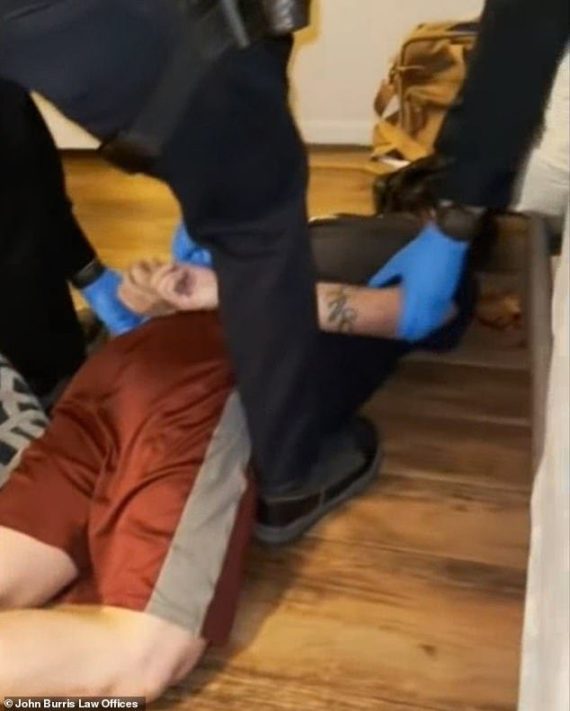
Angelo Quinto, 30, was handcuffed on the floor by police responding to a mental health crisis in December. He died three days later in a hospital. (credit John. L. Burris law offices)
(2-22-21) Images of a white police officer with his knee pressed against George Floyd’s neck last year set off peaceful protests and rioting amid demands for police accountability. What often has been overlooked is that individuals with serious mental illnesses are 16 times more likely to be killed by police and nearly half of all deaths at the hands of the police involve individuals with disabilities. D. J. Jaffe, before his death, reported that 120 police officers also had been murdered by individuals with serious mental illnesses.
While we continue to argue about alternatives to having law enforcement respond when someone is in the midst of a mental crisis, more individuals die. This recent example involves possible head trauma, something we are hearing more about with returning veterans and hits to the heads of pro football players. TBIs can lead to anxiety, depression, paranoia, and suicide. Regardless of whether a crisis is caused by a TBI or a serious mental illness, such as schizophrenia, we must find a better way to protect the lives of those in the midst of a crisis and those sent to respond. From The Washington Post:
Navy veteran in mental health crisis died after police knelt on his neck for nearly five minutes, his family says
Then, he stopped breathing. “Can you take him, please?” she pleads in the video.
Days later, Quinto died in a nearby hospital.
Cops Refusing To Release Information
While the Antioch Police Department has released virtually no information on his case for weeks — including the names of the officers involved or an official cause of death — Quinto’s family now says their own investigation suggests police asphyxiated him by failing to follow proper procedures in a mental health emergency. The family filed a legal claim last week, a precursor to suing the department.
“They put … the knee on the back of his neck and pressed down for about five minutes and snuffed his life out,” John Burris, the family’s attorney, said at a news conference.
Antioch police didn’t immediately respond to a message from The Washington Post late Sunday. The agency, which nearly two months later has yet to post any public statements about Quinto’s death, told the San Francisco Chronicle that the Contra Costa County district attorney and sheriff’s office are investigating the case.
The circumstances of Quinto’s death suggest a parallel to George Floyd, who died last May after a Minneapolis police officer knelt on his neck for more than nine minutes, and also echo a national movement to change how police respond to mental health crises — or even, in some communities, to remove police from responding to such emergencies entirely.
Quinto, who was born in the Philippines, was honorably discharged from the Navy for a food allergy in 2019, the Chronicle reported. He loved online gaming, scuba diving and fishing, his family said at a news conference.
But his behavior changed after suffering a head injury in an apparent assault last year, his family told the Chronicle, and he began suffering bouts of paranoia and anxiety. Late on Dec. 23, he began acting erratically. His sister, Isabella Collins, called 911 for help, and police arrived after 11 p.m. to find his mother embracing him on the floor, according a report compiled by the family’s private investigator, the Chronicle reported.
“He said, ‘Please don’t kill me. Please don’t kill me,’ ” she told KTVU.
His mother eventually began recording on her cellphone, but didn’t capture the initial encounter with police, including the officer allegedly kneeling on his neck. Her video starts as police realize Quinto is unresponsive and then hurriedly remove his handcuffs and roll him into a mobile stretcher. As his mother pleads for information, an officer applies chest compressions in the hallway.
“Does he have a pulse?” she asks. “What is happening?”
Quinto died on Dec. 26.
But it took Antioch police nearly a month to acknowledge his death and their role in the incident, after the San Jose Mercury News began asking about the case. Lt. John Fortner, an Antioch police spokesperson, said at the time that police had handcuffed Quinto but didn’t use any physical force.
“This was a healthy person before, no physical problems,” said Burris, “and within moments, his life is gone.”
Burris said police have refused to release any information on the case to family members or their attorneys, and the officers involved were not wearing body cameras. Along with Quinto’s family, he called for Antioch police to retrain its officers to deal with mental health crises.
“I’m always going to regret calling the police and hope no one has to regret doing what they think is the right thing,” Collins, Quinto’s sister, told KTVU.



